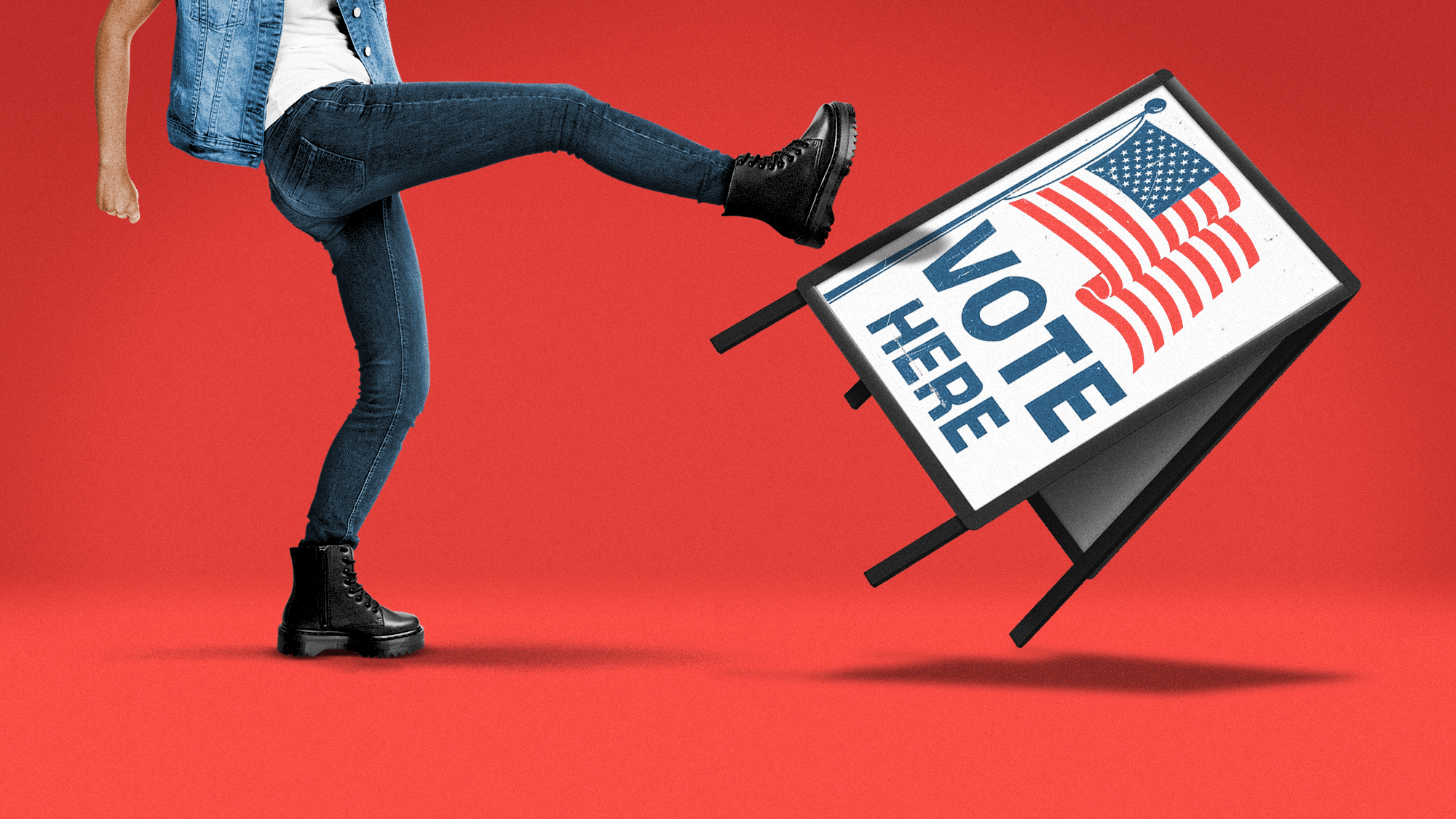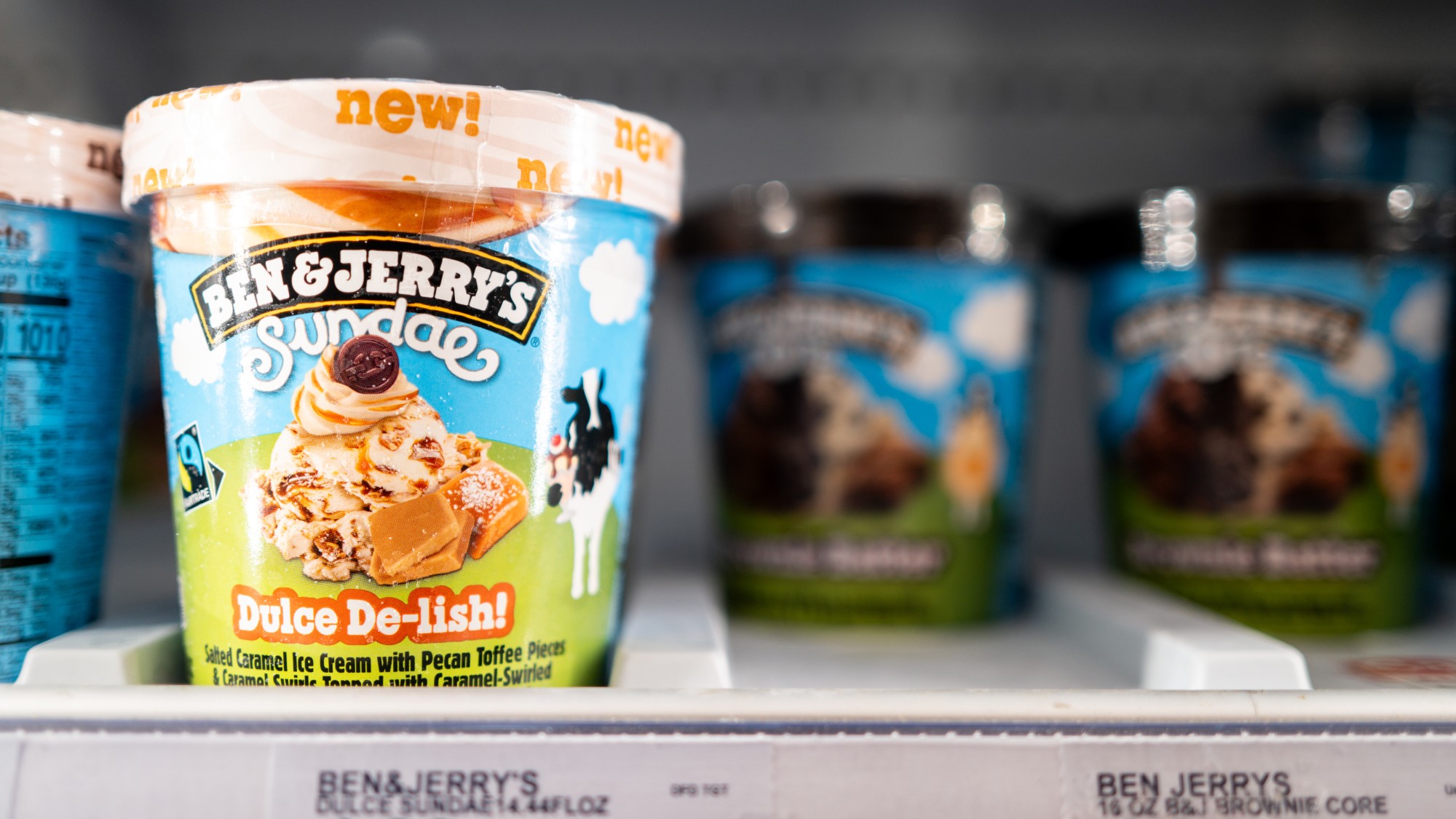Will college Gaza protests tip the US election?
Gaza protests on U.S. campuses pose problems for Biden like the ones that hurt Lyndon B. Johnson in the '60s


A free daily email with the biggest news stories of the day – and the best features from TheWeek.com
You are now subscribed
Your newsletter sign-up was successful
President Joe Biden, under pressure from fellow Democrats to address Gaza protests at U.S. college campuses, last week made his first public remarks about the unrest. He criticized the "chaos" over Israel's offensive against Hamas while defending the freedom of students to speak their minds, USA Today reported. Peaceful protest, Biden said, is "in the best tradition of how Americans respond to consequential issues," but "violent protest is not protected."
Pro-Palestinian students who set up encampments on college quads around the country said Israel's supporters enabled genocide. Israel backers accused protesters of antisemitism. Analysts compared the unrest to the anti-Vietnam War protests of the 1960s, warning Biden could face trouble with voters the way then-President Lyndon B. Johnson did at the height of the Vietnam era. Could the November election hinge on where the protests go from here?
Gaza protests on campus help Trump
It's easy to see how the "current unrest on American college campuses over Israel and Gaza" could help Trump, said David Brooks in The New York Times. Like their Republican counterparts in the 1960s, today's GOP could "use the excesses of the student protest movement to their advantage" by pinning the "mess," as Ronald Reagan called protests at Berkeley in 1966, on Democrats. Lyndon Johnson bowed out, and Richard Nixon won the presidency in 1968 after celebrating "forgotten Americans — the nonshouters; the nondemonstrators." The Biden White House and leading congressional Democrats "have become more critical of lawbreaking protests. They probably need to do a lot more of that if we're going to avoid 'Trump: The Sequel.'"
The Week
Escape your echo chamber. Get the facts behind the news, plus analysis from multiple perspectives.

Sign up for The Week's Free Newsletters
From our morning news briefing to a weekly Good News Newsletter, get the best of The Week delivered directly to your inbox.
From our morning news briefing to a weekly Good News Newsletter, get the best of The Week delivered directly to your inbox.
"Protests of any kind, even those most justified, produce a sense of unease among the public" that benefits the right, said Jeff Greenfield in Politico. A majority of Americans in 1963, when the "civil rights movement was entirely peaceful," said demonstrations "did more harm than good." The violent scenes outside the Democrats' 1968 presidential convention in Chicago compounded the sense that "left-wing lawlessness had gotten out of control." Today's college protests are a gift to Trump because he can point to them as evidence that he has been right all along to call Biden "soft on crime and general disorder." Summer break might "dampen the heat on American college campuses," but if it doesn't, "history suggests that it will be another significant burden on Biden's fight for a second term."
Biden has time to fix the split
The fact that the protests feed Republicans' criticism of Biden is only one of the dangers the protests pose for the president, said Peter Baker, also in the Times. The angry pro-Palestinian students calling Biden "Genocide Joe" could "exacerbate his estrangement with the left wing of his party, particularly among young people who are a key constituency for his re-election chances." Biden still leads among under 30 voters, but he only has an eight-percentage-point edge over Trump, down from a 23-point margin in 2020. Democratic strategists remain confident "young voters will still turn out in force" for Biden, because they care more about abortion rights and the economy. But he needs better numbers to offset cooling support among older voters.
Biden can ill afford a "long, hot summer of protest" that boils over during his August convention and "bleeds into" the conclusion of his "already venomous clash" with Trump, said Stephen Collinson at CNN. But let's not exaggerate. The campus protests against Israel's Gaza offensive and the suffering of Palestinian civilians are less pervasive than the civil rights and Vietnam War protests of the '60s and '70s. And Biden has time during a summer break that could cool passions on campus to win back alienated young voters while also reassuring "more middle-of-the-road voters" who might be swayed by Trump's warning the nation is "spinning out of control." Biden's success might hinge on whether he can get Israel to dial back its planned Rafah offensive, and shift attention to Trump's demand for "deployment of the National Guard to crush protests," which might turn the stain of '60s memories onto Trump.
A free daily email with the biggest news stories of the day – and the best features from TheWeek.com
Harold Maass is a contributing editor at The Week. He has been writing for The Week since the 2001 debut of the U.S. print edition and served as editor of TheWeek.com when it launched in 2008. Harold started his career as a newspaper reporter in South Florida and Haiti. He has previously worked for a variety of news outlets, including The Miami Herald, ABC News and Fox News, and for several years wrote a daily roundup of financial news for The Week and Yahoo Finance.
-
 Political cartoons for February 20
Political cartoons for February 20Cartoons Friday’s political cartoons include just the ice, winter games, and more
-
 Sepsis ‘breakthrough’: the world’s first targeted treatment?
Sepsis ‘breakthrough’: the world’s first targeted treatment?The Explainer New drug could reverse effects of sepsis, rather than trying to treat infection with antibiotics
-
 James Van Der Beek obituary: fresh-faced Dawson’s Creek star
James Van Der Beek obituary: fresh-faced Dawson’s Creek starIn The Spotlight Van Der Beek fronted one of the most successful teen dramas of the 90s – but his Dawson fame proved a double-edged sword
-
 Currencies: Why Trump wants a weak dollar
Currencies: Why Trump wants a weak dollarFeature The dollar has fallen 12% since Trump took office
-
 TikTok: New owners, same risks
TikTok: New owners, same risksFeature What are Larry Ellison’s plans for TikTok US?
-
 Trump wants a weaker dollar, but economists aren’t so sure
Trump wants a weaker dollar, but economists aren’t so sureTalking Points A weaker dollar can make imports more expensive but also boost gold
-
 Leadership: A conspicuous silence from CEOs
Leadership: A conspicuous silence from CEOsFeature CEOs were more vocal during Trump’s first term
-
 The end for central bank independence?
The end for central bank independence?The Explainer Trump’s war on the US Federal Reserve comes at a moment of global weakening in central bank authority
-
 Can Trump make single-family homes affordable by banning big investors?
Can Trump make single-family homes affordable by banning big investors?Talking Points Wall Street takes the blame
-
 How prediction markets have spread to politics
How prediction markets have spread to politicsThe explainer Everything’s a gamble
-
 Phish food for thought: Ben & Jerry’s political turmoil
Phish food for thought: Ben & Jerry’s political turmoilIn the Spotlight War of words over brand activism threatens to ‘overshadow’ the big ice cream deal
